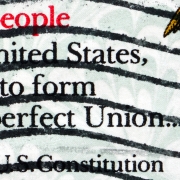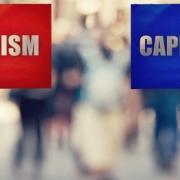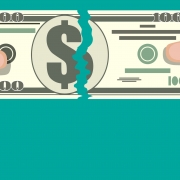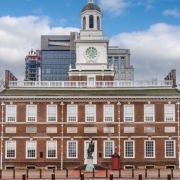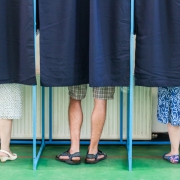A democracy is a political system with institutions that allows citizens to express their political preferences, has constraints on the power of the executive, and a guarantee of civil liberties.
This is the definition provided by OurWorldInData.org in a report on the growth and performance characteristics of democracies around the world.
Applying The Definition.
We can compare this definition with the current state of democracy in the USA. Does it allow citizens to express their political preferences? No. Voters have the choice of being represented by one of two political parties, mirrored halves of the collectivist criminal gang that operates government. If a voter wants to be represented by a libertarian or a Catholic Socialist or the holder of some other small minority point of view, there is no chance. And what if a citizen does not believe that the system of representative politics is valid, that it is impossible for a few elected officials to represent the political preferences of 325 million people, and that the policy compromises these elected officials arrive at are satisfactory to no-one? There is no alternative.
Are there constraints on the power of the executive? The President’s recent missile attack on Syria was not supported by any declaration of war in Congress, nor was there any significant public debate. The executive’s theft of income and wealth via taxation and the IRS is unconstrained, as is the use of policies such as eminent domain. Talk about constraints to victims of shooting and beating by the militarized police force. Or simply analyze the ever-expanding forest of legislative and administrative rules that places a heavier and heavier weight of restrictions on commerce and innovation every year, month and day. Constrained? Hardly.
Does our democracy guarantee civil liberties? There is no end of groups who will testify to the fact that their civil liberties are, and have been, violated. These include, but are not limited to, American Indians, Blacks, LGBT, gun violence victims, and right-to-lifers and reproductive rights activists alike. The problem is that governments in democracies claim to guarantee rights that they can’t grant in the first place. Individuals have natural rights with which they are born, the inalienable rights of life, liberty and the pursuit of happiness. Beyond these, whenever government purports to grant rights, such as “freedom from want” as President Roosevelt did, or “the realization….of the economic, social and cultural rights indispensible for…dignity” as did the Universal Declaration Of Human Rights adopted by the General Assembly of the United Nations in 1948, they create a totalitarian platform. All these and similar rights are based on the interpretation of government as a coercive organization that can impose the redistributionist laws and interventionist actions to realize them. Democracies turn these aspirations into promises and then impose the restrictions on freedom that are required to even attempt to bring them about.
Democracies Don’t Correlate With The Social Characteristics They Claim To Deliver.
Democracy is a pretty young political system. According to Our World In Data, there were no democracies until 1808. There were 10 in 1899, 77 in 1999, and 87 in 2009. They don’t necessarily correlate with prosperity. Our World In Data charts GDP per capita, and tells us that Singapore, which scores negative on the scale of democratic political systems, is less affluent than only Luxembourg, which is one of the countries that score a +10 on that scale of democracy. Democracies do a little better on human rights, but, again, Singapore, with a negative democracy score, has a higher human rights protection score than all but half a dozen democracies.
It’s hard to escape the feeling that democracy has run its course and it’s time for it to be replaced or to morph into a different system. We can’t know what that system is yet, but we are able to define its characteristics and how those desirable characteristics will be brought to the world.
Self-organizing: We are beginning to understand more and more that biological and technical systems are self-organizing. In social sciences too, the Hayekian system of self-organizing spontaneous order is gaining ground as technology, biology and social networks merge. We don’t need government. We need only some general rules that apply to everyone and open up the opportunity for unhampered individual initiative in the service of each other.
Disintermediated: In a self-organizing system, we have no need for the institutions that mediate between the individual and the centralized state, such as Congress or the Federal Reserve or the departments of the Executive Branch. Individuals will co-ordinate with each other to develop efficient mechanisms of social order without top-down direction.
Decentralized: Centralization is a big influence on the degree of coercion government exerts. The concentration of absolute power in Washington DC, in national institutions and even in centralized state governments leads to authoritarian excesses. We can organize from the family – the primary natural organizational unit – outward to neighborhoods, HOA’s, free towns and free cities. Small networks overlapping other small networks and nested inside still others can create a self-organizing ecosystem based on collaboration and flexible integration. We can dispense with the imposition by force of a geographical monopoly of political power at the national, state and county level.
Entreprenurial: Entrepreneurs are the co-ordinating influence in the self-organizing system. They sense the wants and needs of individuals and customers, and they assemble resources to meet these needs in new and better ways. If successful, they are catalysts for betterment and economic growth. The entrepreneurial system is dynamic and efficient and works best when there are no restrictive interventions and constraints from government. The entrepreneurial society is a just society, much more so than a democracy.
Free from value confiscation: One of the greatest restrictions on economic growth in the entrepreneurial society is the confiscation via taxation of the value that entrepreneurs create by serving their fellow citizens. We may be entering an era when encrypted systems like blockchain can shelter some or all of this value creation from the confiscators.
These 5 characteristics of a new social order are all in the realm of the possible. We see trends moving in these directions. It may not be possible to predict exactly the shape and nature of the new order, but it will not, hopefully, be democratic.
Photo by Randy Colas on Unsplash
